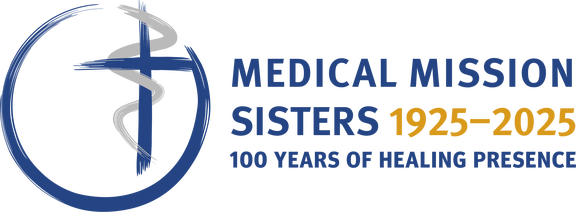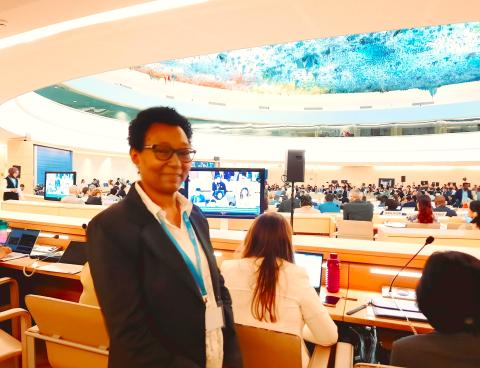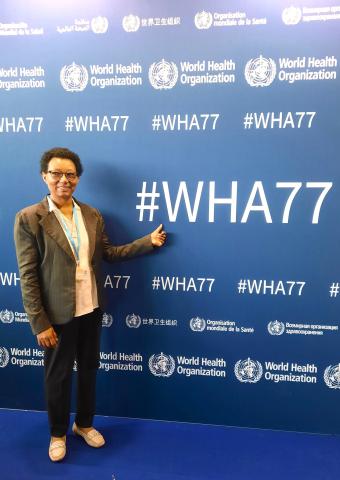#WHA77: All for Health, Health for All
Sister Belaynesh Abera, MMS’ Representative to the NGO Forum for Health and the World Health Assembly, is sharing the following report on this year’s World Health Assembly which took place in Geneva, Switzerland.
From May 27th to June 1st 2024, the WHO decision-making body, the Seventy-seventh World Health Assembly (#WHA77), brought together hundreds of government health minsters, global health experts, non-governmental representatives and policy makers to discuss and decide the policy agenda and strategies for WHO’s public health goals. WHO officials also presented plans for its work programme for the next four years from 2025-2028. Sister Belaynesh attended the Assembly on behalf of the Society.
The #WHA77 held a series of strategic round table discussions, involving WHO experts and WHA delegates, who were civil society representatives and partner agencies. The discussions was mainly focused on current and future priorities for public health issues of global importance. In his opening remarks to the Assembly, WHO Director-General, Dr Tedros Adhanom Ghebreyesus, highlighted the growing burden of non-communicable diseases (NCDs) and mental health conditions and stressed the need for urgent efforts to make significant progress towards achieving the Sustainable Development Goals (SDGs) by 2030. Dr Tedros urged Member States to consider and adopt the 14th General Programme of Work, which offers a collective strategy to accelerate progress towards achieving these goals, and is designed to improve equity. He underscored the significant global efforts being made to increase access to mental health services through the WHO Special Initiative for Mental Health.
The agenda items for the #WHA77 were categorised under 4 Pillars:
Pillar 1 - One billion more people benefiting from universal health coverage
Health issues treated were: immunisation; ending tuberculosis (TB); neglected tropical diseases; an acceleration towards achieving SDG goals; antimicrobial resistance (AMR); and malaria.
Pillar 2 - One billion more people better protected from health emergencies
Under this Pillar, the Assembly addressed: public health emergencies; preparedness and response; amendment of the International Health Regulation (2005); the Global Health and Peace Initiative; poliomyelitis; and polio and smallpox eradication.
Pillar 3 - One billion more people enjoying better health and well-being
Topics addressed included: social determinants of health; maternal, infant and young child nutrition; well-being and health promotion; climate change; pollution and health; economics and health for all; and health conditions in the Occupied Palestinian territories, including East Jerusalem and in the Occupied Syrian Golan. The focus on the threat that climate change poses to public health was unprecedented with health ministers approving a resolution on climate and health.
A significant step taken during the Assembly was the resolution adopted on Social Participation for Universal Health Coverage, Health and Well-being. #WHA77 endorsed a resolution to implement, strengthen and sustain regular and meaningful social participation in decision-making processes for health. This is the first ever resolution on social participation that has been passed. This new step on social participation represents a paradigm shift in global health. It will offer opportunities to bring together members of different strata of the society, including representatives of civil society organisations and government officials, to address the health issues of the more vulnerable members of society.
Social participation, as defined by WHO, means: “Empowering people, communities and civil society through inclusive participation in decision-making processes that affect health across the policy cycle and at all levels of the system.” It is hoped to provide opportunities for people to participate in health-related decisions, as appropriate, promising a bottom up approach in decision-making.
Pillar 4 - More effective and efficient WHO providing better support to countries
Topics treated under this Pillar were: financing and implementation of the programme budget 2004-2025; the draft Fourteenth General Programme of Work 2025-2028 (known as GPW14); sustainable financing; and the WHO Investment Round.
The Member States were tasked with deliberating resolutions, which are legally binding, and strategies on how to work together to respond to the health issues categorised under the above-mentioned 4 Pillars.
The Assembly was also tasked to launch a call for countries to support a new financing mechanism which has been prepared by WHO for the years 2025-2028. Here, the focus of discussion was on how dependency on voluntary contributions has impacted the outcome of the activities of WHO and has several limitations. This is because the voluntary contributions are tightly earmarked to specific programmatic areas or geographical locations, based on donor interests, which limits WHO’s ability to use available funds, as needed. It was also noted that voluntary contributions are often provided on an annual or bi-annual basis. This makes it difficult for the WHO to plan for the 4-year period of its General Programme of Work.
In order to increase the predictability of voluntary contributions and ensure that all areas of GPW14 are covered, WHO is spearheading a new financing mechanism, known as the WHO Investment Round, which was launched at #WHA77. However, it will only be finalised in November 2024 during the inter-governmental meeting. At the Assembly, WHO was therefore calling for a more sustainable, reliable and flexible funding system to implement the agency’s core strategy for 2025-2028, referred to as the 14th General Programme of Work (GPW14).
The goal of GPW14 is: “Promoting, Providing and Protecting Health.” To achieve this, six strategic objectives are laid out. The objectives are centred around: climate change and health; health determinants; primary healthcare and stronger health systems; health service coverage and financial protection; preparing for risks and emergencies; and detecting and responding to emergencies.
In the Assembly, it was noted that there is a need for a rapid and comprehensive reform of WHO, if the organisation is to become an effective presence in vulnerable zones. The present context of the social and health reality of the global world calls for global and efficient coordination, as well as practical political steps to be taken to improve health for all, focused on the impact of the social determinants of health. Solutions must be global, comprehensive and sustainable, given the limited resources which need pragmatic decisions. It was noted that the discussion and resolutions are not about improving healthcare, but about how to use the limited funds effectively, where most needed. The Assembly added that it is time to call for improving health promotion, networking and complementarity, which require inter-sectoral collaboration.
The 194 member countries on 1st June 2024, the closing day of the #WHA77, took a significant step when all agreed to amend the 2005 International Health Regulation (IHR). It was indeed a historic moment. The package of amendments to the Regulation is expected to strengthen global preparedness, surveillance and responses to public health emergencies, including pandemics. Furthermore, the Assembly made concrete commitments to completing negotiations on a global pandemic agreement within a period of one year. It is hoped that the proposed “Pandemic Agreement” will help Member States to facilitate and improve international coordination, collaboration and equity to prevent, prepare for and respond to future pandemics. The decisions and related resolutions are meant to help member countries also to establish systems that are comprehensive in order to protect the health and safety of their citizens everywhere from the risk of any future outbreaks and pandemics.
Dr Tedros in his closing remarks stated: “The historic decisions taken today demonstrate a common desire by Member States to protect their own people, and the world’s, from the shared risk of public health emergencies and future pandemics. The amendments to the International Health Regulation (IHR 2005) will bolster countries' ability to detect and respond to future outbreaks and pandemics by strengthening their own national capacities, and coordination between fellow States, on disease surveillance, information sharing and response. This is built on commitment to equity, an understanding that health threats do not recognise national borders, and that preparedness is a collective endeavour.”
He went on to add: “The decision to conclude the Pandemic Agreement within the next year demonstrates how strongly and urgently countries want it because the next pandemic is a matter of when, not if. Today’s strengthening of the IHR provides powerful momentum to complete the Pandemic Agreement, which, once finalised, can help to prevent a repeat of the devastation to health, societies and economies caused by COVID-19.”
Sister Belaynesh, thank you for keeping us informed.


